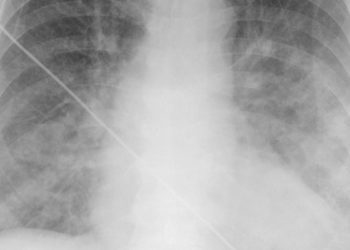Resynchronization improves survival in mild heart failure, heart block [MADIT-CRT trial]
Image: PD
1. Cardiac-resynchronization therapy reduced mortality at 7 years follow-up in patients with reduced ejection fraction, mild heart failure, and left bundle-branch block.
2. Cardiac-resynchronization therapy did not improve outcomes in patients without left bundle branch block.
Evidence Rating Level: 1 (Excellent)
Study Rundown: Cardiac-resynchronization therapy (CRT) has been established as an important treatment for patients with New York Heart Association (NYHA) class III or IV heart failure. The Multicenter Automatic Defibrillator Implantation Trial with Cardiac Resynchronization Therapy (MADIT-CRT) compared CRT and implantable cardioverter defibrillator (ICD) therapy in patients with mild or asymptomatic heart failure. Initial findings published in 2009 after a median follow-up period of 2.4 years showed that CRT significantly reduced the primary combined endpoint of death or non-fatal heart failure event; however, the benefit of CRT was driven primarily by reduced risk of non-fatal heart failure events. The present study prospectively assessed the long-term outcomes of patients enrolled in MADIT-CRT. The primary end point was death from any cause.
After 7 years of follow-up, CRT significantly reduced both mortality and non-fatal heart failure events among patients with left bundle-branch block (LBBB). Significantly, patients without LBBB did not benefit from CRT; results suggest that they may even be harmed. This study is important because it demonstrates that CRT results in a mortality benefit for patients with mild heart failure and that this benefit persists after 7 years of follow-up. Additionally, it indicates that CRT is not an appropriate therapy for patients without LBBB. One potential weakness of this study is that some centers participating in the original trial declined to participate in the extended follow-up study. Nevertheless, this study provides important information about the utility of CRT in mild heart failure.
Click to read the study, published today in NEJM
Click to read an accompanying editorial in NEJM
Relevant Reading: Cardiac-resynchronization therapy for the prevention of heart-failure events
In-Depth [randomized controlled trial]: The MADIT-CRT trial randomly assigned patients with mild or asymptomatic heart failure, an ejection fraction of 30% or less, and a prolonged QRS duration (greater than 130 msec) to receive either CRT or ICD therapy. The present study was designed to evaluate the long-term effects of CRT and to determine whether the benefits of CRT are restricted to patients with LBBB. The primary end point was death from any cause; secondary end points included a non-fatal heart failure event.
Among patients with LBBB, the cumulative death rate at 7 years follow-up was 18% in the CRT group compared to 29% in the ICD-only group (unadjusted HR, 0.63; 95% CI, 0.47 – 0.84; p=0.002). The survival benefits did not differ according to sex, QRS duration, or cause of cardiomyopathy. Patients undergoing CRT were also less likely to experience a non-fatal heart failure event (unadjusted HR 0.42; 95% CI, 0.33 – 0.52; p <0.001). However, among patients without LBBB, CRT did not improve mortality (unadjusted HR, 1.31; 95% CI, 0.87 – 1.96; p=0.19) or non-fatal heart failure events (unadjusted HR 1.10; 95% CI, 0.79 – 1.53; p=0.59).
More from this author: Spironolactone not beneficial in heart failure with preserved ejection fraction [TOPCAT trial], Mutations in PKA catalytic subunit associated with Cushing’s syndrome, Addition of bevacizumab fails to benefit overall survival in newly diagnosed glioblastoma [RTOG 0825 trial], Solanezumab does not improve cognition or functioning in Alzheimer’s disease [EXPEDITION trials], Low brown fat may explain increased susceptibility to type 2 diabetes in south Asians
©2012-2014 2minutemedicine.com. All rights reserved. No works may be reproduced without expressed written consent from 2minutemedicine.com. Disclaimer: We present factual information directly from peer reviewed medical journals. No post should be construed as medical advice and is not intended as such by the authors, editors, staff or by 2minutemedicine.com. PLEASE SEE A HEALTHCARE PROVIDER IN YOUR AREA IF YOU SEEK MEDICAL ADVICE OF ANY SORT.







